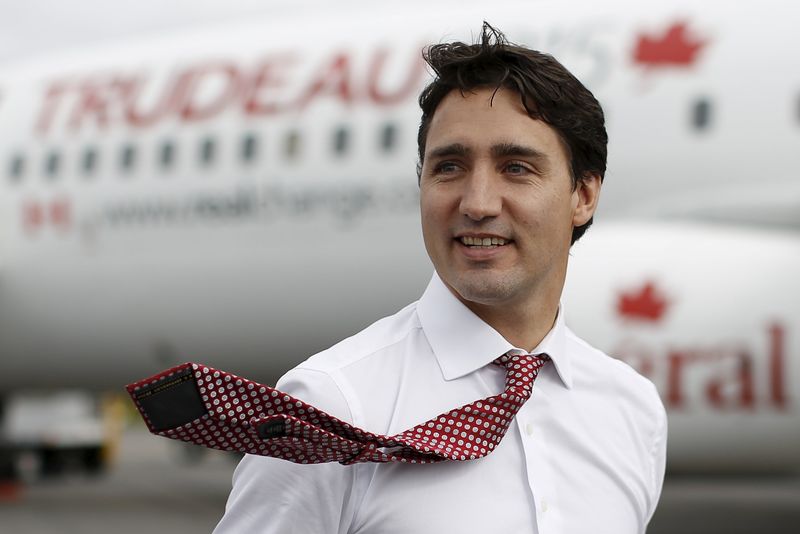By Randall Palmer
MONTREAL, Oct 20 (Reuters) - The long Canadian election
campaign was supposed to highlight just how inexperienced
Liberal leader Justin Trudeau was and give the ruling
Conservatives an ample supply of gaffes to use in attack ads.
The gambit underestimated Trudeau, the 43-year-old son of
charismatic former Prime Minister Pierre Trudeau, and, by
setting expectations so low, may have helped him instead.
Trudeau's Liberals will form Canada's next government after
defeating Conservative Prime Minister Stephen Harper on Monday.
"I think the Conservative advertising ultimately has
backfired," said Liberal candidate Kevin Lamoureux. "He's more
than met the expectations that people had of him."
The seeds of the Liberal victory were sown in July, when the
party ran third in polls behind the left-leaning New Democratic
Party and the Conservatives.
Before the campaign began on Aug. 2, Liberal strategists
said Trudeau was being advised to go negative to counter the
bruising Conservative ads that he was "just not ready."
But his inner circle, including campaign co-chairs Katie
Telford and Dan Gagnier, principal adviser Gerald Butts, and
chief of staff Cyrus Reporter, backed Trudeau's position that
they should focus on the positive, as they see it.
"We were not surprised by the negative ads. It wasn't a new
thing. But Justin Trudeau's optimistic high-road approach struck
a chord," said Chrystia Freeland, a Liberal member of
parliament.
The strategy was to portray a sunny personality through ads,
speeches and personal contact with ordinary people.
Trudeau, who considers himself "a learned extrovert," spent
half his time at campaign stops milling through crowds and
posing for selfies. Most of those pictures made their way onto
Facebook (O:FB), Instagram and other social media where they were
reposted or retweeted for a multiplier effect.
By August, the Liberals were largely indistinguishable from
the NDP in their appeal to center-left voters and the three main
parties were running neck-and-neck.
A dearth of major economic policies had helped NDP leader
Thomas Mulcair eat into Liberal support as he laid out policies
on cheap daycare and a C$15 ($11.60) minimum wage for federally
regulated workers.
At a meeting in June, the party realized its plan to balance
the budget and spend on infrastructure, while enriching the
overall tax package for the middle class, was no longer viable
as the fiscal picture worsened on weaker oil prices, two senior
Liberals familiar with the discussion said.
They would probably have to go into deficit or scale back
their promises. A final decision was not made until August, the
two Liberal sources said.
Some had advocated running big deficits - as much as C$40
billion or C$50 billion, similar to the levels the Conservative
government ran in response to the 2007-09 financial crisis - but
they settled for a deficit of up to C$10 billion a year for
three years, a third senior Liberal said.
They nervously eyed the NDP, lest they pip the Liberals to
the post.
It was a risk, the Liberal insiders said, but in the end it
gave the party a clear distinctive policy and positioned them
left of the NDP, which had pledged a balanced budget.
"As of that moment, I think it became clear that we were the
party of real change and that Stephen Harper and Tom Mulcair
were two peas in a pod on the economy," said veteran Liberal
legislator John McCallum, a former bank chief economist.
NIQAB EFFECT
The Liberals also got a lift from a controversial government
attempt to ban the veil worn by Muslim women, the niqab, during
citizenship ceremonies. Both Mulcair and Trudeau opposed the
ban, but anti-niqab sentiment was heavy in the francophone
regions of Quebec, where the NDP is strongest.
NDP support in Quebec began to plummet, dragging down its
national numbers, and then NDP voters elsewhere started to
migrate to the Liberals.
"We had the same position (as the NDP). The difference was
that when it came up, we had something else to talk about,"
another Liberal insider said, referring to the party platform.
The NDP, on the other hand, were offering cheap daycare,
which Quebec already had, and balanced budgets, which were
unpopular in a province tired of austerity.
And while the Conservatives gained in Quebec, Harper's niqab
stance and other positions seen as anti-immigrant did not go
down well in other parts of Canada.
Good fortune also played a part.
The famed wall of ads the Conservatives were expected to
mount at the end of the campaign fizzled. While the Tories
bought front page newspaper ads in the campaign's final Saturday
and had their share of broadcast ads, there was no evidence of a
tsunami that swamped the Liberals.
Instead, the Liberals benefited in the final week after
taking a punt in August to buy ad time for October's baseball
playoffs.
The price then was C$12,000 for a thirty-second spot in
Canada. When the Toronto Blue Jays made the playoffs, drawing
massive Canadian television audiences, the cost zoomed up to
C$140,000 apiece. By then, the Liberals had their exposure
locked in at the end of an expensive, 11-week campaign.
Former Conservative Prime Minister Brian Mulroney once
warned rivals not to underestimate the younger Trudeau: "(His
father) was a very tough, able guy and the apple doesn't fall
far from the tree."
On Monday, some Conservatives grudgingly conceded just that.
"You have to hand it to the Liberals: they've run a really
good campaign," said a Conservative member of Parliament.
